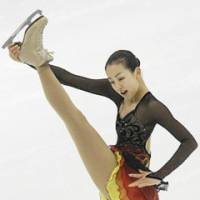It is amazing how quickly the dynamic can change in skating.
In one instant the seemingly impossible can appear probable and the assumed balance of power can shift.
There is a chance that this is what happened last week when the Korea Skating Union announced that defending Olympic and world champion Kim Yu-na would sit out the entire Grand Prix season with an injury to her right foot.
The timing could not have been worse for Kim, who is hoping to retain her Olympic crown at the Sochi Games in February. She has skated infrequently since winning the gold at the Vancouver Games in 2010, and had appeared ready to get into a seemingly normal routine as the Olympic campaign beckoned.
But that is all out the window now. The injury has significantly altered her plans, and the exact extent of the impact it will have on Kim's readiness in Russia is still unclear.
One thing that is certain is that where there once appeared to be only a slim chance for two-time world champion Mao Asada to overtake Kim and grab the gold at the Olympics, now the odds do not seem as long.
The bottom line is that Mao now has a legitimate shot at topping the podium in Sochi.
It's not just that Kim is injured and will miss the GP season and a possible showdown with Mao at the GP Final in Fukuoka, it's that when an athlete gets a glimmer of hope, they are often inspired to seize upon it.
Mao could certainly use a boost, and though she would no doubt like to beat Kim when she is at the top of her game, the gold medal will go to the skater who is at their best on those two nights in Sochi next February.
Mao has had no official comment on Kim's injury so far, but it would be interesting to know what she is thinking.
Will this provide her with extra motivation?
Maybe.
Mao has done a lot for skating, and there are many fans around the world who would like to see her win the sport's ultimate prize. She will have to earn it, but the task may have just gotten a bit easier.
There will be other opponents besides Kim to contend with at the Olympics, but with the elite skaters we are talking about just a handful of people. If Kim is not 100 percent, that means a totally different dynamic.
The guess here is that Kim's injury is likely worse than is being let on. It has to be fairly serious for her to be ruled out of the GP season, which is crucial in an Olympic year.
Is Kim's team being overly cautious?
Perhaps.
But the reality is that pulling her out of competitive action against other top skaters this fall seems a bit odd.
The KSU's announcement about Kim's injury said she, "suffered a slight injury to her metatarsal on her right foot. It requires six weeks of treatment, followed by a rehabilitation program to prevent the injury from recurring. As such, we decided that it would be better for her to skip the entire Grand Prix Series."
The interesting fact attached to the story in the Chosun Ilbo about Kim's injury was that it also mentioned that Kim needed to meet the Olympic qualify standard to compete in the top group of skaters in Sochi.
To do this, it stated she may compete at the NRW Trophy in Dortmund, Germany, (where she won last year in her comeback) or the Four Continents in Taipei.
The NRW Trophy is held in the first week of December. which seems too close to the end of the GP season to be realistic if the injury is what they say it is.
The other possibility — the Four Continents — in January seems more realistic.
Either way, the decision to bypass the GP series is hard to dissect. With all of the other skaters trying to peak for Sochi, you would think Kim would want to test herself against the best competition.
We saw what happened in 2011, when she sat out the GP season and then finished second at the worlds to Miki Ando.
It was the equivalent of trying to come off the bench after sitting out the entire season in baseball and trying to hit a home run in the World Series.
Not an easy feat.
Encouraging start: Ando met the Olympic qualifying standard with her second-place finish at the Nebelhorn Trophy last month in Oberstdorf, Germany, where she finished behind world junior champion Elena Radionova of Russia.
Though Ando's showing was encouraging, she finished more than 25 points behind Radionova and clearly has a lot of work to do if her long-shot bid to skate in a third Olympics is to come to fruition.
Ando still must advance through the Kanto regionals and the Eastern Japan regionals to skate in the national championships. Those are both achievable, but knocking off Mao, Akiko Suzuki or Kanako Murakami for one of Japan's three tickets to Sochi is another matter.
Fine showings: Japan's up-and-coming skaters continue to impress during the Junior GP season. Keiji Tanaka won the event in Kosice, Slovakia, two weeks ago, while Riona Kato took third place.
Ryuju Hino, who finished second in Mexico City in early September, placed second again last week at the JGP in Minsk, Russia.
Rika Hongo also made the podium in Minsk, finishing third.



